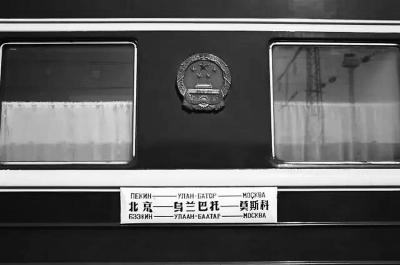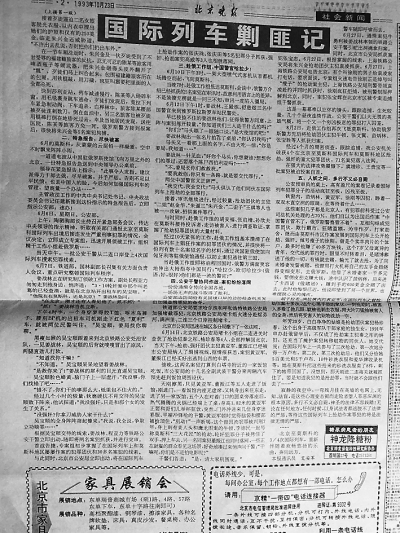
At that time, Ai Anjun wrote this arrest experience into a long newsletter, which was first published in the first edition of Beijing Evening News on October 23, 1993, and later published a serial report in the Evening News, which aroused widespread concern.


The TV series "Moscow Action" broadcast in 2018, starring Xia Yu and Betty, gained a good reputation once it was broadcast. However, due to the copyright issue of the play and the script, the TV series was sued. Shanghai Putuo District People’s Court made a first-instance judgment on July 31, and found that the producer of the play, Banner (Shanghai) Digital Media Co., Ltd. (hereinafter referred to as Banner Media), constituted copyright infringement, and sentenced the company to compensate the plaintiff, Ai Anjun, for economic losses of RMB 1 million.
justify
The defendant claimed that the script was based on the dictation of the police who witnessed it.
The Sino-Russian international train robbery caused a sensation throughout the country in the 1990s.
The story introduction shows that the TV series "Moscow Action" was adapted from the sensational "Great Robbery of the China-Russia Train" in 1993: on the international train from Beijing to Moscow, more than a dozen gangsters robbed the passengers in the carriage. In order to catch the robbery gang, the Chinese police sent an ad hoc group headed by Chen Erli to Russia for arrest, and carried out a tortuous and thrilling pursuit trip in a foreign country.
The reporter learned that the plaintiff, Ai Anjun, was one of the participants in the hunt that year, was also the propaganda officer of the public security system of Beijing Railway Bureau, and was the first author to publish an article to report the historical event. In 1995, the film "China-Russia Train Robbery" was adapted from the works of Ai Anjun.
Ai Anjun sued that since 1993, he has published more than 30 detective reports and documentary literary works related to the "Sino-Russian train robbery". The TV series "Moscow Action" is adapted from the story of "The Great Robbery of the Train between China and Russia".
Ai Anjun sued the writers Xu and Hu of Flag Media and Moscow Action, arguing that the defendant had embezzled the bridge in his works and adapted it into a TV series, claiming an economic claim of 1 million yuan.
Defendant Flag Media said when responding to the lawsuit that "Moscow Action" was a brand-new TV series created by inviting the witness of the historical event of "China-Russia International Train Robbery" and the police officer who handled the case at that time, taking Cheng’s dictation as the creative basis, and taking himself as the prototype of the TV series hero "Chen Erli" and conducting relevant interviews with the police officers who participated in the case in that year.
The defendant claimed that Mo did not refer to Ai Anjun’s documentary literature and enjoyed independent copyright. And think that the related historical figures and events are objective in history and the common wealth of society, and there is no substantial similarity between the two works.
dispute
What is the nature of witnessing the dictation of the police?
It is reported that the prototype of Chen Erli called by Banner Media — — Cheng, who participated in the detection of the Sino-Russian train robbery, was the main commander of the operation at that time.
There is a confirmation letter from Cheng in the defendant’s evidence. He admitted that as a witness of the incident, he told the process and details of the action in that year orally, and agreed that Flag Media used its oral content and used it as the protagonist to create TV scripts and shoot TV dramas.
The main screenwriter Xu also provided the court with interview notes on Cheng. Xu said that because he thought that Cheng’s dictation was more reliable, he didn’t consider other data collection at that time, and he didn’t watch related movies and written works.
However, Ai Anjun believes that most of the characters in the TV series "Moscow Action" copied the characters in their own works. In terms of scenes, the TV series shows that passengers are robbed and beaten, and robbers chase after passengers after parking, which are basically similar to the robbery process described in the plaintiff’s works. In addition, there is a story in the script that describes the robber robbing and raping the victim in front of the victim’s husband, which is similar to what he published in Woodpecker magazine.
What is the nature of Cheng’s dictation as one of the witnesses? The judgment discussed this.
The judgment pointed out that although Cheng was one of the main participants in the Sino-Russian international train chase in that year, he personally experienced the arrest activities related to crimes, but he did not participate in all the actions such as arrest, interrogation and escort in all cases. In an interview with Xu in 2015, Cheng stated that in addition to the actions he participated in, there were a lot of heroic deeds of other police officers. He disclosed these contents to Xu, much later than the works published by Ai Anjun since 1990s.
Therefore, the court found that Cheng’s statement was similar to the content expressed in Ai Anjun’s works, and his dictation was a repetition of the plaintiff’s works and did not constitute a new work. Because Cheng’s statement is not the first disclosure to the outside world, the content of his statement to Xu does not constitute an "oral work" in the sense of copyright law. Therefore, the TV script created according to Cheng’s oral content cannot be taken for granted as original.
contrast
Take "Second Sister" Zhao Jinhua as an example to compare the similarity.
The reporter noted that the court compared the descriptions of the villain "Zhao Jinhua" in the two works with examples in the judgment.
Zhao Jinhua, the criminal "Second Sister" created by Ai Anjun, is a villain based on his personal experience in escorting Zhao Jinhua back to China and Zhao Jinhua’s identity and criminal facts he learned during the escort. He once described it in the works published in Woodpecker magazine:
At 4: 20 pm on June 14th, Jiang Zhanlin, Wang Diandong and others rushed to the police station of Gadensky Railway Station to interrogate the suspect Zhao Jinhua, nicknamed "Second Sister". … … Zhao Jinhua was in cahoots with Zhu Xingjin and other gangsters, and was called "the first lady in Moscow" by the gangsters. In many crimes, she is the mastermind and the leader of robbery, with a pistol in her waist, bossy and domineering. (Woodpecker, page 11)
I asked Zhao Jinhua if he often went to Casino. She showed a hint of pride: "often." She said that she had a glorious life of being rich and bossing around. When she jumped the queue, she got into the habit of smoking jadeite cigarettes. Anyone she was willing to help, she handed each other a box of jadeite cigarettes and put them on a small table. When the robbers on the train see who has the jade cigarette case in the box, they will immediately withdraw: "This is the second sister’s person, don’t grab it!" (Woodpecker, page 19)
There are some similar characters in the script of the TV series "Moscow Action":
For example, in section 38 of episode 1 of the script, in the private room of a brothel in Moscow, "Second Sister" walked into the private room, sat down on the sofa and lit a cigarette.
On the first train in episode 5, the second sister sat in the aisle and lit a phoenix cigarette. The cigarette case of Feng Huang cigarette was held in the second sister’s hand.
In episode 14, section 17, on the night of the K3 train robbery, a China man was robbed in his box. He sat on the sleeper and dared not move, his eyes pointed out of the box. At this time, Second Sister just walked to his balcony door. Second sister sat in the aisle and lit a phoenix cigarette.
In the later TV series Operation Moscow, Zhao Jinhua’s Phoenix smoke was changed to peony smoke.
judgement
Confirmed that it constituted copyright infringement and awarded compensation of 1 million.
The judgment takes the description and performance of the villain Zhao Jinhua in the defendant’s TV series and scripts as an example, and holds that the defendant’s expression of this role — — There are many scenes and scenes of smoking peony cigarettes, which obviously originated from the plot of Zhao Jinhua smoking Jade brand cigarettes in the plaintiff’s works. Zhao Jinhua’s enchanting appearance, domineering personality and other plot contents are also consistent with the characters created in the plaintiff’s works. It can be seen that the TV script follows the bridge in the plaintiff’s works.
The court held that the description and performance of Zhao Jinhua’s characters in the TV series and scripts of Moscow Action basically revolved around the plot expression described in Ai Anjun’s works. Through the above examples and the comparison of the works of the two parties in court, it can be seen that the defendant’s TV script and the works published by the plaintiff have the same internal structure and plot collocation, forming a similar overall appearance. From the overall effect, the defendant is still a reproduction or adaptation of the plaintiff’s previous works.
In view of the fact that Xu and Hu have transferred the script copyright of Mo to Banner Media, and Banner Media has been granted the copyright by a third party, which is the copyright owner of Mo. Accordingly, the Putuo District People’s Court of Shanghai ruled that Banner Media should compensate Ai Anjun for the economic loss of copyright infringement of RMB 1 million.
interlinkage
The Train Robbers
In the early 1990s, the K3/4 international train from Beijing to Ulaanbaatar and Moscow became a convenient passage for "international profiteers" to go to Russia for gold. Some lawless elements took an eye on the goods and money of this train, and changed from a profiteer to a "knife-bearer".
On May 26th, 1993, the K3 international train bound for Russia arrived at Erenhot, the border station of China, more than 10 hours after its departure. China got off the train by the police according to the regulations, and then the train entered the territory of Mongolia. On that day, a total of four brutal thugs were waiting outside the country for this train from Beijing.
During the six-day and six-night trip, this train was looted by four gangs and turned into a "bad luck train". According to incomplete statistics, hundreds of passengers were injured, more than 20 people were injured and stabbed, and three women were raped and gang-raped. The value of the robbed property reached one million yuan. (Reporter Lei Zhang)